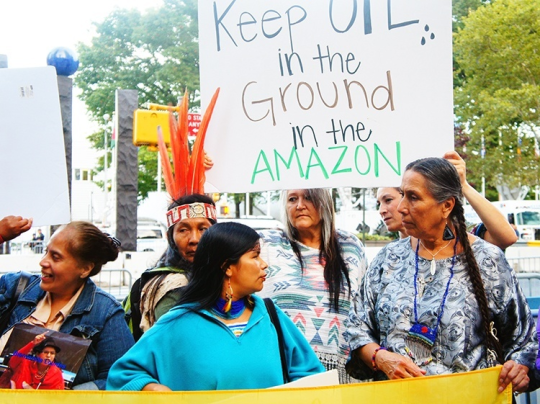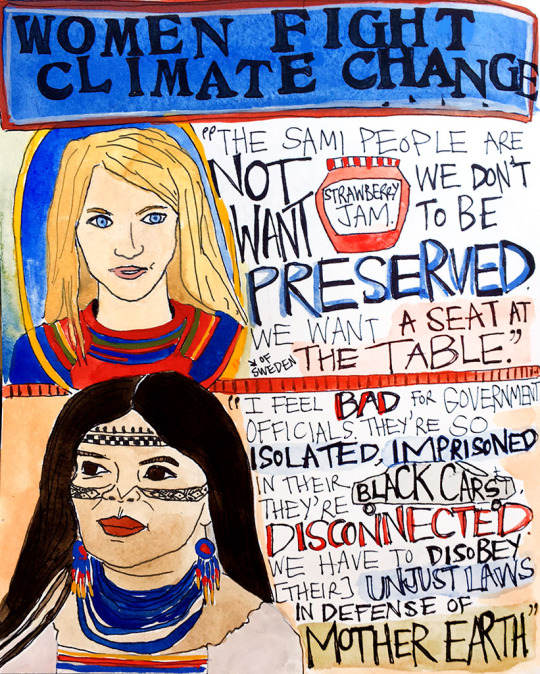#ecowarriors

Women leaders of the Sápara and Kichwa people of the Ecuadorian Amazon with international allies outside of the United Nations, New York City, September 2015. Photo: Emily Arasim

Patricia Gualinga, from the Sarayaku territory of Ecuador, who we got to see speak at the Women’s Earth & Climate Action Network event at the UN Climate Talks in Paris, is leading a coalition of women from the Ecuadorian Amazon in protests on International Women’s Day against Ecuador’s controversial deal with a Chinese oil company that hands over Sápara and Kichwa tribal land to oil exploration.
STATEMENT OF AMAZONIAN INDIGENOUS WOMEN IN DEFENSE OF LIFE, TERRITORY, AND ‘GOOD LIVING’ (BUEN VIVIR)
Puyo, Ecuador, Feburary 02, 2016
In the city of Puyo, we, Amazonian indigenous women, representatives of the Sapara and Shiwiar Nationalities, the Kichwa Kawsak Sacha and Sarayaku Peoples, and the communities of the Bobonaza Basin, want to express our deep concern with the contract of exploitation and exploration signed by the Ministry of Hydrocarbons with the company Andes Petroleum for Blocks 79 and 83 that directly affect the Sapara, Kichwa, Shiwiar, and Sarayaku territories.
We reject the signing of this contract which will affect our territories, the forest, the water, and the air; exactly how we have seen it occur in Block 10 in the Province of Pastaza. This is where serious social and environmental impacts have been generated, where women are the main victims and their ability to feed their families becomes impaired. There is deterioration of family health, and they suffer the division of their communities and other forms of violence.
This government policy has infringed on our rights since we have not been adequately consulted. We as women have not been considered and we have not participated in those government informational meetings. Plus, the consultations were not carried out as mandated by the ruling of the Inter-American Court of Human Rights (IACHR) in the 2012 case Sarayaku v. Ecuador.
Blocks 79 and 83 affect more than 40% of the Sapara Nationality’s territory which was recognized by UNESCO as a “Masterpiece of Intangible Cultural Heritage of Humanity” on May 18, 2001 because their language and culture are in danger of disappearing. This threat is increased with the development of an oil project in these territories.
Therefore, we reject this oil policy of the government and the possibility of further oil concessions in the southern Amazon; We denounce that deceptive mechanisms have been used to obtain signatures of community members in order to justify supposed prior consultation processes. We stand firm in the defense of our territories, for the defense of life and the good living of our families and communities.
In her opening remarks at the WECAN event in Paris, Osprey Orielle Lake, founder of the U.S.-based Network, recounted a conversation she’d had with an indigenous Sarayaku mother. “We carry our babies on our backs at night through the jungle,” the woman told her. “We can do anything.”
